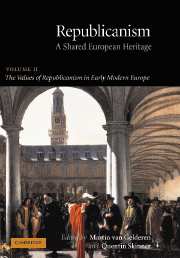Book contents
- Frontmatter
- Contents
- Contents of Volume I
- Acknowledgments
- Introduction
- Part I Republicanism and Political Values
- Part II The Place of Women in the Republic
- 7 Rights or Virtues: Women and the Republic
- 8 Women, Republicanism and the Growth of Commerce
- 9 Feminist Republicanism and the Political Perception of Gender
- Part III Republicanism and the Rise of Commerce
- Bibliography
- Contributors
- Index of Names of Persons
- Index of Subjects
9 - Feminist Republicanism and the Political Perception of Gender
Published online by Cambridge University Press: 11 January 2010
- Frontmatter
- Contents
- Contents of Volume I
- Acknowledgments
- Introduction
- Part I Republicanism and Political Values
- Part II The Place of Women in the Republic
- 7 Rights or Virtues: Women and the Republic
- 8 Women, Republicanism and the Growth of Commerce
- 9 Feminist Republicanism and the Political Perception of Gender
- Part III Republicanism and the Rise of Commerce
- Bibliography
- Contributors
- Index of Names of Persons
- Index of Subjects
Summary
What relationship could present-day feminist theory build with the tradition of republican thought? What value could a theory developed from the context of the ancient city-states possibly have for a feminism confronted with the infinitely complex interactions between politics, the social, and gender in modernity? In the past decades, feminist theory has in manifold ways explored the utility as well as the impediments of the various conceptualisations of modern society by Marxism, liberalism, communitarianism and post-structuralism. It has allowed these idioms to reverberate in its proper assessments of male dominance and female subjectivities. The respective involvements, meanwhile, instead of accommodating feminism's need for a theory of politics that extended to and suited its proper concerns, rather resulted in exposing the (sexual) politics of theory. The recurring exasperation all idioms caused probably converge on this one specific ground: the various theoretical angles on modernity share a deficient attention to the range of politics in modern life. In one way or another, they suffer from an insufficient or one-sided attention with respect to the specific political quality of the social as an agonistic as well as gendered terrain of both agency and construction of subjectivity.
Also republicanism has been subjected to an exasperated exposition of its sexual politics. The feminist reception of classical republican thought has testified to a profound pessimism with regard to the possibility of employing republican idiom as a resource for feminist theory or practice.
- Type
- Chapter
- Information
- RepublicanismA Shared European Heritage, pp. 157 - 174Publisher: Cambridge University PressPrint publication year: 2002
- 8
- Cited by



